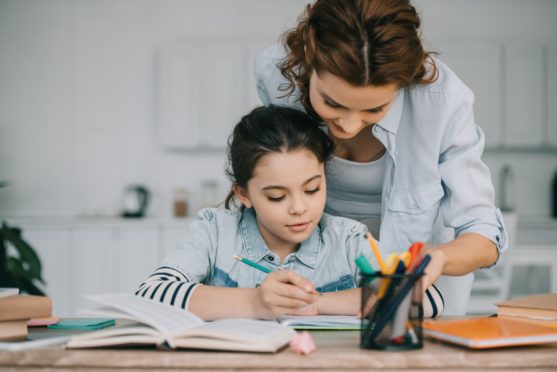
Only two in five parents feel confident about teaching their children at home amid Covid-19 school closures, a survey suggests.
Nearly half (47%) of middle-class parents say they feel confident homeschooling while schools are closed, compared with just 37% of working-class parents, according to a poll by a charity.
Since March 21, schools, colleges and nurseries across the country have only been allowed to open for vulnerable children and those with a parent identified as a key worker.
Children from working-class families are more likely to have spent nothing on their child’s home learning amid the closures, compared with those in the middle classes (60% compared with 45%), the Sutton Trust survey found.
Fewer than half (42%) of parents feel assured about home education, according to the survey.
The poll, which questioned more than 1,500 parents, found that just under a quarter (23%) of children have had at least £50 spent on materials to support their education at home.
One in six (14%) have had more than £100 spent on them, while nearly one in 10 (8%) have had more than £150 spent on their home learning.
The charity is calling for high-quality online tuition for all disadvantaged pupils to be funded through a voucher scheme, or through a network of quality-assured tutoring providers.
Sir Peter Lampl, founder and chairman of the Sutton Trust and chairman of the Education Endowment Foundation, said: “Parents across the country are grappling with the challenge of homeschooling their children.
“The home learning environment has never been more important, but as today’s polling shows, less than half of parents feel confident about teaching their child at home.
“Better-off parents are more able than poorer families to spend money on resources and support for their children.
“To reduce the impact of school closures on the most disadvantaged pupils, we’d like to see high-quality online tuition available to the most disadvantaged pupils.”
Geoff Barton, general secretary of the Association of School and College Leaders, said: “We are not surprised that many parents do not feel confident about teaching children at home as they have been put in a completely unexpected situation very suddenly.
“We are particularly concerned about the impact on disadvantaged families and the potential for this situation to further widen educational gaps between rich and poor.”
Mr Barton said there was no expectation on parents to homeschool their children and he said schools will continue to provide pupils with schemes of work that teachers can deliver remotely.
The Department for Education published a list of educational resources online on Tuesday that parents can consider using to support home learning.
It came after the BBC announced plans to support the education of “every child in the UK” and provide “rhythm and routine” for their parents.

Enjoy the convenience of having The Sunday Post delivered as a digital ePaper straight to your smartphone, tablet or computer.
Subscribe for only £5.49 a month and enjoy all the benefits of the printed paper as a digital replica.
Subscribe